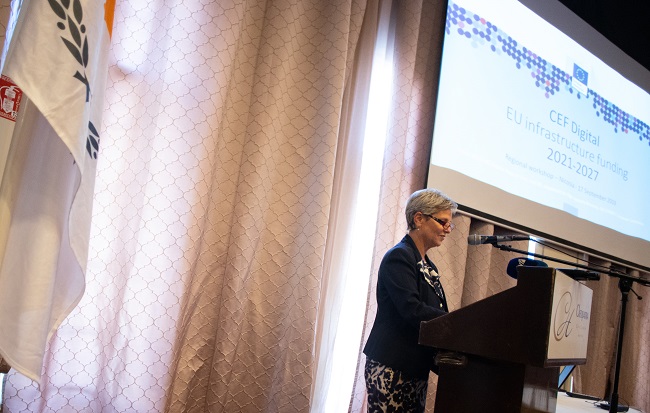Press Releases

17-09-2019 12:19
Welcome note by the MTCW Mrs Vassiliki Anastassiadou at the Connecting Europe Facility (CEF) Digital Workshop
It gives me great pleasure to welcome you in Cyprus and to extend my appreciation to the organizers for inviting me to address this important event regarding the Connecting Europe Facility 2 Digital (CEF2 Digital) and its role in funding digital connectivity projects during the new programmatic period 2021-2027.
Modern societies, especially in developed and developing countries, are experiencing the digital transformation of our era as a necessity and not as an optional policy that needs to fulfill temporarily and ad-hoc needs and requirements. In 2016, the European Commission announced the vision of the Gigabit Society, where the availability and adoption of very high-capacity networks will allow the widespread use of products, services and applications in the Digital Single Market. Over the next 10 years, it is estimated that up to 50 billion objects, from homes to cars, will be connected globally. We understand that Internet of Things (IoT), Higher Speed Networks, and 5G Wireless Technology are already at our doorstep.
Europe is preparing for this Gigabit era of widespread and very high-speed connectivity which will adopt next-generation technologies such as 5G, Artificial Intelligence, High Performance Computing, Blockchain etc. The implementation of the above can be achieved through ultrafast broadband connectivity networks. The New Electronic Communications Code is expected to help the swift and extensive roll-out of 5G and other next generation technologies throughout Europe.
Dear friends,
The need to adapt to this new reality, it is more than obvious, where emerging internet-based services compete with existing telecommunications services, while continuing to ensure a high level of consumer protection and market competition. But in order to do so efficiently there are a number of significant challenges to overcome, such as the limited very high speed connectivity for fixed and mobile infrastructures and the risks of insufficient capacity to deal with rapid market and technological changes such as the rise of the 'Internet of Things'.
The new Code will set the frame for the development of the electronic communications sector for the next ten years and beyond. It will stimulate healthy competition and increased investment in 5G and fiber networks, so that every citizen and business can enjoy very high quality connectivity and an increasing choice of innovative digital services.
Cyprus should not remain inactive in the digital revolution that is taking place. We are following closely all the developments and we have already started the process for the adoption of the code in our national legislation. In this direction, we are prepared to take the necessary steps so that Cyprus will not stay behind of these new technology developments.
In addition, our telecom operators, already have started implementing plans to roll out Fiber to the Home connections and have upgraded their cellular networks to provide 4G+ coverage services. There is also a growing market interest in 5G, and all mobile operators have asked for pilot rights to use the 3.5 GHz band. The Department of Electronic Communication has granted these pilot rights until the launch of the auction for 5G spectrum, which is anticipated to take place during the first quarter of 2020. Also, the Department of Electronic Communications has recently announced the public consultation for the zones 700MHz, 3.6GHz and 26GHz and it is expected by March 2020 to grant the first licenses in 5G bands.
According to the Digital Economy and Society Index (DESI) of 2019, Cyprus ranks 21st for connectivity. Cyprus performs well in fixed and fast broadband coverage and in fixed and mobile broadband take-up. In all these categories, Cyprus is close to the EU average and the scores are improving.
Fixed network coverage is among main the factors boosting Cyprus’ ability to benefit from the digital economy. Implementation of the Broadband Cost Reduction Directive which has already been transposed into our national law and additional spectrum assignments will reinforce fixed and mobile coverage, particularly for high and ultra-high-speed networks, and boost coverage in rural areas.
However, the main challenge is still to encourage take-up of high-speed broadband connectivity, which is influenced by factors such as pricing, a lack of compelling content and low digital literacy. To address pricing issues, Cyprus announced in January 2019 a pilot voucher scheme, which will subsidize new subscriptions or upgrades for speeds of 100 Mbps and above for a duration of 12 months. The intension is to cover approximately one third of the annual costs, which amounts to a subsidy of €360 the maximum per subscription per year. The total budget is estimated to approximately €800,000, coming entirely from national funds.
The National Broadband Plan has recently been updated in order to be aligned with the targets of the European gigabit society and the 5G action plan. By the end of 2020 we are planning to draft a new broadband plan which will include detailed actions in accordance with the guidelines of the Commission, making effective use of tools available at European level.
The Action Plan will include projects on infrastructure development, information and awareness raising, digital skills, digital entrepreneurship, security as well as projects for increasing the demand for ultrafast connections. I also would like to stress that the Ministry of Transport, Communications and Works is focused in addressing the digital divide between urban and rural areas both in high-speed and very high-speed broadband networks and to take advantage of the opportunities for developing the digital skills of rural residents.
Investing in new technologies in a multidisciplinary way will bring synergies, efficiency and productivity gains. The combined use of digital technologies with other emerging technologies will bring new and innovative business models, will generate competiveness, jobs and growth. According to the European Commission, if the proposed measures to roll out 5G across Europe were implemented by 2020-2025, the EU could gain an estimated €113 billion every year. These measures could also lead to the creation of up to new 2.4 million jobs.
In this direction, Cyprus can use all the available funding tools in the new programmatic period 2021-2027, including CEF2 Digital, in order to resolve main issues on the way to digital transformation. Issues like low ultrafast coverage and take-up, high pricing and low digital literacy are of high importance for the government and will make all necessary actions to improve the country’s digitalization figures. From our part, we are committed to making every necessary effort to support and facilitate the activities of the telecom operators in Cyprus that will lead to further investments, leveraging on our experienced personnel and funding opportunities we have to offer.
In conclusion, I would like to thank once more the organizers from European Committee and Broadband Competence Office Support Facility, for organizing this special event. I wish you all a productive workshop and a fruitful discussion.
( DC )
Relevant Press Releases

19-04-2024 16:42
PIO e-mail Αlerts service is suspended


20-03-2024 11:43
Acceptance of postal items to Israel has resumed



